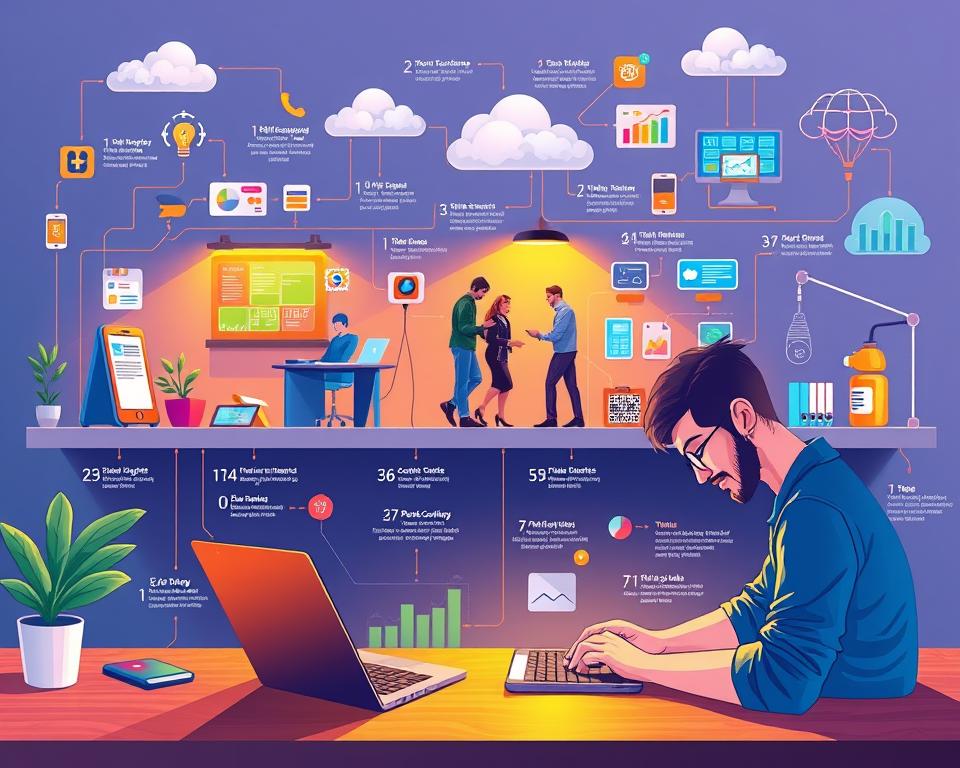AI in mobile apps is getting more popular. Many developers use these technologies to make their apps better. They want to improve user experience and stay ahead of the competition.
Machine learning is a big part of this trend. It lets apps learn from how users behave. This way, apps can change to meet user needs better.
By using AI, developers can make apps more personal and fun. This makes users happier and more likely to use the app.
If you want to start using AI in your app, there’s a great guide. You can find it at AI-based mobile applications development. It will teach you everything you need to know.
The use of machine learning in apps is really exciting. It opens up new ways for apps to grow and innovate.
Table of Contents
Key Takeaways
- AI in mobile apps can improve user experience and enhance functionality
- Machine learning development is a key aspect of AI-based mobile app development
- AI-based mobile apps can learn from user behavior and adapt to their needs
- Developers can create more personalized and engaging experiences for their users with AI
- Machine learning development enables apps to gain a competitive edge
- AI-based mobile app development has opened up new possibilities for innovation and growth
Understanding AI and Machine Learning in Mobile Applications
AI features are now key in making mobile apps more personal and fun. By adding AI-powered solutions to apps, companies can better connect with their customers. This can lead to more sales and happier customers.
Using AI in apps brings many benefits. It makes the app better for users, works more smoothly, and saves time. Machine learning algorithms help apps understand what users like and suggest things they might enjoy. Natural language processing helps create chatbots that offer help and support.
Defining AI and ML in the Mobile Context
In mobile apps, AI and machine learning mean using algorithms and data to make apps smarter. This includes predictive analytics to guess what users might like and suggest it to them.
Key Differences Between AI and Machine Learning
AI and machine learning are not the same, even though they’re often mixed up. AI is the bigger field that aims to make machines as smart as humans. Machine learning is a part of AI that uses algorithms and data to help machines learn and get better.
Business Benefits of Implementing AI in Mobile Apps
Using AI in mobile apps can greatly help businesses. It makes apps better at understanding and talking to users. This is thanks to natural language processing.
AI also makes apps smarter about what they see. This is because of computer vision. It lets apps understand pictures and videos, making experiences like augmented reality possible.
The main benefits of AI in mobile apps are:
- Improved user engagement
- Increased revenue
- Enhanced customer experience
By using natural language processing and computer vision, businesses can make their apps more personal. This leads to happier users and more growth for the company.
Essential AI Features for Modern Mobile Applications
Today’s mobile apps use AI to make things better for users and help businesses grow. Natural language processing lets apps understand and talk back to users. Computer vision capabilities help apps see and understand pictures and videos.
Predictive analytics is key, as it helps apps guess what users will do next. This lets apps give users things they’ll like. Personalization engines are also vital. They make sure each user gets content and offers that fit them best.
These AI features bring many benefits. They make apps more useful and fun. They also help apps guess what users want and give them what they like.
- Improved user experience
- Enhanced functionality
- Increased engagement and conversion rates
- Personalized recommendations and offers
By using predictive analytics and personalization engines, apps can stand out. For instance, an app can guess what users might like and show them special offers. This makes users happy and keeps them coming back.
| AI Feature | Benefits |
|---|---|
| Natural Language Processing | Improved user experience, enhanced functionality |
| Computer Vision Capabilities | Interpret and analyze visual data, enhanced functionality |
| Predictive Analytics | Forecast user behavior, personalized recommendations |
| Personalization Engines | Tailor content and offers to individual users, increased engagement and conversion rates |
How to Use AI & Machine Learning in Your Mobile App Development Process
To use AI and machine learning in your app, start by setting clear goals. Identify the problems you want to solve and how AI and machine learning can help. For example, AI can make the app more user-friendly, or machine learning can boost app performance.
When picking AI and machine learning tools, think about scalability, compatibility, and how easy they are to integrate. It’s also crucial to ensure that your development team has the necessary skills and expertise to work with these technologies. You might need to train your team or hire new members.
Some key things to consider in AI and machine learning development include:
- Data collection and processing: Decide what data to collect, how to process it, and how to use it to train your models.
- Model training and testing: Train and test your models to make sure they work well.
- Integration with existing systems: Make sure your AI and machine learning fit with your current systems and infrastructure.
By following these steps and considering these factors, you can successfully use AI in mobile apps and machine learning development. This will enhance your app and improve user experience.
Choosing the Right AI Framework for Your App
Choosing the right AI framework is key in mobile app development. It greatly affects your app’s performance and growth. Look for a framework that is scalable, flexible, and easy to use.
Developers have many AI frameworks to choose from, like TensorFlow, Core ML, and PyTorch. Each has its own strengths and weaknesses. For example, developing AI apps with TensorFlow is great for big projects. Core ML is best for iOS and macOS apps.
- Compatibility with the target platform
- Support for various AI features, such as natural language processing and computer vision
- Ease of integration with existing infrastructure
- Scalability and performance metrics, such as accuracy, precision, and recall
By carefully choosing the right AI framework, developers can make the app development process smooth. This leads to a high-quality app with strong AI features.
Data Collection and Processing Strategies
Getting data right is key for AI and machine learning in mobile apps. Natural language processing and computer vision need top-notch data to work well.
To make sure data is good, we must use strong data prep and annotation. This means fixing missing data, making sure all data is the same scale, and scaling features. Also, using data analytics and visualization tools helps us understand how users act and how the app does.
- Use natural language processing to analyze user feedback and improve app functionality
- Implement computer vision to enable image recognition and object detection
- Utilize data analytics to track user behavior and identify trends
By using these methods, developers can make their data systems better. This leads to better AI and machine learning in mobile apps.
| Technology | Description |
|---|---|
| Natural Language Processing | Enables apps to understand and analyze human language |
| Computer Vision | Allows apps to interpret and understand visual data |
Implementation Best Practices for AI Features
When adding AI to mobile apps, think about security, performance, and testing. Creating custom AI solutions means planning carefully. This ensures AI features are secure, like using data encryption and access controls. Predictive analytics help spot security risks early.
Improving performance is key, as AI can use a lot of power. Methods like model pruning and knowledge distillation can make AI lighter. This makes it better for mobile devices. Personalization engines also benefit from predictive analytics, making user experiences better by offering what users might like.
Testing and validating AI models is crucial for their accuracy and reliability. This means testing them with various datasets. This way, they can handle different situations and edge cases. By following these steps, developers can make AI-powered apps that are secure, fast, and reliable, offering a great user experience.
- Use predictive analytics to identify potential security threats
- Optimize AI models for performance, using techniques such as model pruning and knowledge distillation
- Use personalization engines to provide a better user experience
- Test and validate AI models thoroughly, using diverse datasets
Cost Considerations and ROI Analysis
When using AI in mobile apps, it’s key to think about the costs and potential returns. The expenses for development, deployment, and upkeep can be high. Machine learning development needs a lot of resources. But, the advantages of AI in mobile apps, like more revenue and better user interaction, can make the costs worth it.
It’s crucial to evaluate the ROI of AI and machine learning projects. A detailed cost-benefit analysis helps businesses decide if AI and machine learning are right for them. Important things to look at when checking ROI include:
- Development costs: The cost of creating and launching AI-powered mobile apps
- Deployment costs: The cost of starting and keeping AI-powered mobile apps running
- Maintenance costs: The cost of updating and improving AI-powered mobile apps
- Revenue growth: The possible increase in income from AI-powered mobile apps
- User engagement: The possible better interaction with users from AI-powered mobile apps
By looking at these points and doing a deep ROI analysis, businesses can fully use AI in mobile apps. AI in mobile apps can change how businesses talk to customers and make money. It’s a vital investment for companies looking to grow and succeed.
Common Challenges and Solutions in AI Implementation
Integrating AI into mobile apps can face several hurdles. One big issue is making sure the data used to train AI is top-notch. High-quality data is key for AI to work well. To tackle this, developers should gather and refine large datasets. They also need to clean and validate the data.
Managing resources well is another big challenge. This includes finding and keeping the right team, and making sure there’s enough power for AI tasks. By focusing on resource management, developers can make their AI work smoothly and grow with their app.
Technical Hurdles
- Data quality issues
- Model drift and updates
- Integration with existing infrastructure
To beat these technical obstacles, developers can use data checks and model updates. They should also make sure their systems work well together. This way, their AI will be precise, dependable, and fast.
Scaling Issues
As AI gets more complex, scaling can become a problem. To solve this, developers can use cloud computing and spread out tasks. This makes sure their app can handle more users and tasks without a hitch.
Real-World Success Stories and Case Studies
Many companies have used AI and machine learning in their mobile apps. They’ve used natural language processing and computer vision to make things better for users. For example, a well-known virtual assistant app uses natural language processing. This lets it understand and answer user questions, making users happier and more engaged.
Another example is a shopping app that uses computer vision. It lets users scan and identify products easily. These stories show how AI and machine learning can help mobile apps grow and improve customer experience.
- Improved user engagement through personalized recommendations
- Enhanced customer experience with natural language processing and computer vision
- Increased revenue through targeted advertising and sales
By looking at these success stories, developers can learn a lot. They can see how AI and machine learning can lead to success and innovation in mobile apps.
Future-Proofing Your AI Mobile App
To stay ahead in the fast-changing mobile app world, future-proofing your AI app is key. This means using new tech and planning for growth. By adding predictive analytics and personalization engines, you can meet changing user needs.
Here are some ways to future-proof your AI app:
- Use cloud computing and distributed processing for flexibility and growth.
- Apply predictive analytics to guess what users will want next.
- Integrate personalization engines for custom experiences and better user interaction.
By focusing on future-proofing, your AI app will stay competitive and useful over time.
As the app world keeps changing, it’s important to keep up with AI and machine learning news. This way, you can make smart choices to keep your app ahead and successful for years to come.
Regulatory Compliance and Ethical Considerations
When making AI in mobile apps, it’s key to think about rules and ethics. Ethical issues in AI apps are vital for fairness and trust. This means following laws like GDPR and CCPA for data safety.
The use of machine learning development in apps can lead to fairness issues. To fix this, developers can use methods like feature attribution. This makes AI systems clear and easy to understand. Here are the main points to consider:
- Data privacy and security
- Transparency and explainability
- Fairness and bias mitigation
By focusing on rules and ethics, developers can make AI in mobile apps that are both new and reliable. It’s important to understand the ethics of machine learning development. This means being open, fair, and accountable.
Performance Monitoring and Optimization Techniques
When making mobile apps, it’s key to check how well AI features work. We use metrics like accuracy and recall to see how well AI models do. This helps us find ways to make AI better for users.
Using data tools helps us understand how users interact with apps. This way, we can make AI features that keep users coming back. For more on how AI improves apps, check out this resource.
To make AI better, we can trim down AI models or transfer knowledge to smaller ones. This makes AI work faster and better on phones. It also makes apps more enjoyable for users.
- Keep updating and improving AI models
- Use transfer learning to speed up development
- Set up real-time feedback mechanisms for user input
Conclusion
Artificial intelligence (AI) and machine learning (ML) are changing mobile app development. They use natural language processing, computer vision, and predictive analytics to make apps more personal and interactive. This means apps can now understand and adapt to what users like.
AI and ML can do a lot for mobile apps, from making them better for users to helping businesses grow. Developers can make apps that are easier to use and more fun. As these technologies get better, we’ll see even more exciting changes in mobile apps.
To make the most of AI and ML, we need to set clear goals and choose the right technologies. We also need to make sure these new tools work well with what we already have. This way, we can make apps that are not just new but also better for everyone.



















